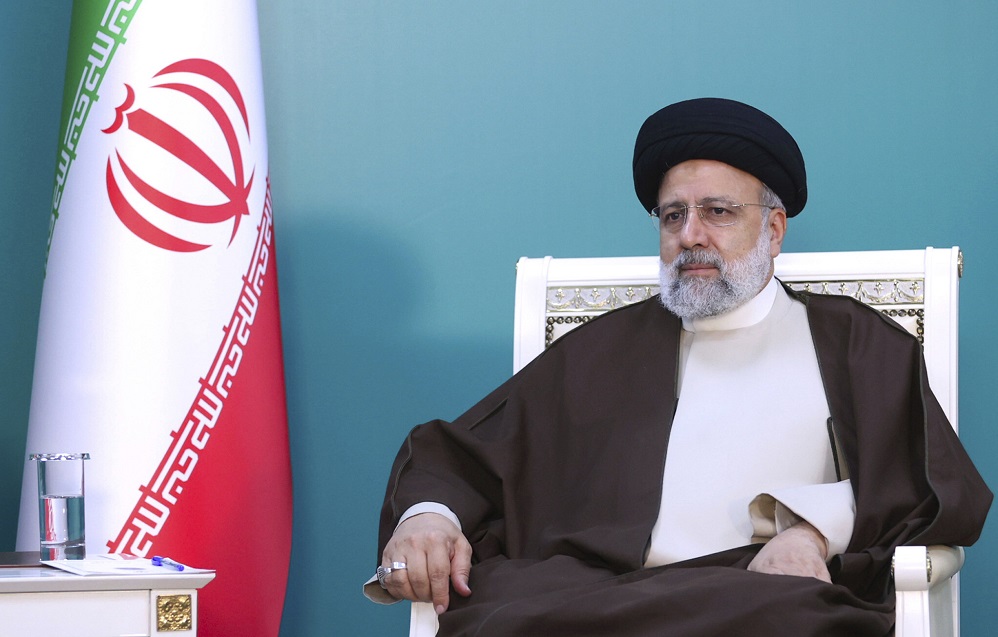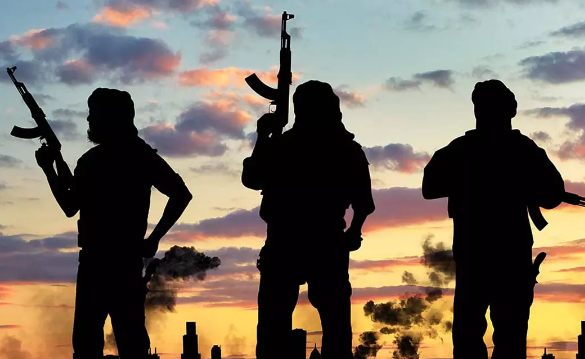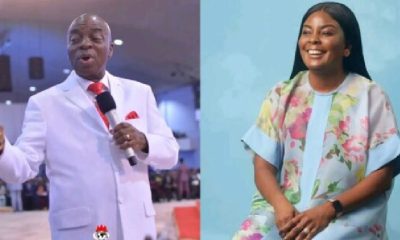Foreign
Iranian President: Five Things to Know about the Helicopter Crash

The helicopter carrying Iranian President, Ebrahim Raisi that crashed on Sunday in the northwestern part of the country is still on search.
According to Iran’s Deputy President for Executive Affairs Mohsen Mansouri, the helicopter of President Raisi and two more copters were en route to the city of Tabriz after the president and his Azerbaijani counterpart inaugurated Qiz Qalasi Dam at the border between the two countries.
Half an hour into their flight, Raisi’s helicopter lost contact with the two other copters, which prompted them to search the area.
Here are five things to know about the missing chopper.
1. The helicopter carrying President Ebrahim Raisi crashed on Sunday in the northwestern part of the country while he was returning from his visit to Azerbaijan.
2. The helicopter was carrying Iranian President Ebrahim Raisi, the country’s Foreign Minister Hossein Amirabdollahian, the governor of Iran’s East Azerbaijan province and other officials and bodyguards.
3. The helicopter went down near Jolfa, a city on the Iran-Azerbaijan border about 375 miles northwest of Tehran, the Iranian capital.
4. Rescue teams are trying to locate the Iranian President Ebrahim Raisi’s helicopter which made a hard landing, but bad weather is complicating rescue efforts.
5. IRNA News Agency disclosed that two members of President Ebrahim Raisi’s entourage have contacted rescue teams, and this shows that the air incident involving their helicopter has not been rough.
However, the Iranian Twelver Shia marja’, Ayatollah Khamenei has urged Iranians not to be worried, he said, “There will be no disruption to the operations of the country”.
Foreign
Ukraine Accuses Russia Of Launching 2800 Aerial Bombs, Over 1400 Drones In 14 Days

Ukrainian President, Volodymyr Zelensky, has accused Russia of ongoing hostilities, stating that since the beginning of April, Russia has launched nearly 2,800 aerial bombs, over 1,400 Shahed drones, and approximately 60 missiles at Ukraine.
Zelensky’s statement, released on Monday, reads, “Currently, 38 people are receiving treatment inmedical facilities in Sumy following yesterday’s Russian ballistic strike — among them, 9 children. Eleven people, including 3 children, are in critical condition.”
“Every effort is being made to provide them with maximum assistance. Yesterday’s strike alone claimed 34 lives and left 119 people injured. Tragically, 2 children were killed, and another 15 were wounded.”
“Another 7 people were injured overnight in Odesa during a ‘Shahed’ drone attack. Last night, the Russians also struck Slovyansk, Uman, Kharkiv, Beryslav, and other cities and villages.”
“All the damaged sites are civilian: apartment buildings, stores, a car service station.”
“I thank all the services and everyone involved in rescuing people and defending lives. Russian terror continues every day and night. Since the beginning of April alone, the Russian army has used nearly 2800 aerial bombs, over 1400 attack drones — most of them ‘Shaheds’ — and nearly 60 missiles of various types, including ballistic ones.”
“Only real pressure on Russia can stop this. Tangible sanctions are needed against the sectors that finance Russia’s killing machine. The one who brought the war must be stopped and held accountable for what they have done; that is only fair,” Zelensky said.
In an earlier statement yesterday, Zelensky urged the world not to remain silent in the face of Russia’s continued aggression against Ukraine: “As of now, 31 people are known to have been killed in Sumy by the Russian ballistic missile strike. Among those killed were two children. My condolences to the families and loved ones… More than 84 people have been wounded, including 10 children. All of them are receiving the necessary assistance.”
“It is crucial that the world does not stay silent or indifferent. Russian strikes deserve nothing but condemnation. There must be pressure on Russia to end the war and guarantee security for people. Without truly strong pressure, without sufficient support for Ukraine, Russia will continue dragging this war out.”
Zelensky also accused Russia of rejecting a potential peace opportunity involving U.S. President Donald Trump.
“It’s now the second month that Putin has been ignoring the U.S. proposal for a full and unconditional ceasefire. Unfortunately, there in Moscow they are convinced they can keep killing with impunity. Action is needed to change this situation.”
World leaders have condemned the latest wave of Russian attacks and pledged solidarity with Ukraine.
On Saturday, top diplomats from Russia and Ukraine traded accusations over breaches of a tentative ceasefire agreement brokered by the United States. The deal aimed to halt attacks on critical energy infrastructure, signaling an attempt to ease tensions in the third year of the war.
However, Sunday’s strike underscored the fragility of such negotiations and the continued toll on Ukrainian civilians.
The war, which began with Russia’s full-scale invasion in February 2022, has resulted in tens of thousands of deaths and millions displaced, with no comprehensive peace agreement in sight.
International observers have raised concerns that the missile strike may constitute a violation of international humanitarian law.
Sumy, located near Ukraine’s northeastern border with Russia, has faced repeated assaults since the war began but had seen a relative lull in recent months. Sunday’s bombing marks one of the deadliest strikes in the region in over a year.
Ukrainian officials have called on allies to increase military aid and intensify sanctions on Russia, warning that continued attacks on civilian areas threaten any hope for a negotiated resolution to the war.
Foreign
US orders 30-day registration for all foreign nationals or face jail, deportation

By Francesca Hangeior
The United States Department of Homeland Security (DHS) has announced a new rule requiring all foreign nationals who stay in the country for more than 30 days to register with the federal government.
The directive, introduced this week, is one of the strictest immigration measures in recent years.
In a post titled “Message to Illegal Aliens” and tagged to President Donald Trump and Homeland Security Secretary Kristi Noem, the agency stated,
“Foreign nationals present in the U.S. longer than 30 days must register with the federal government. Failure to comply is a crime punishable by fines and imprisonment. @POTUS Trump and @Sec_Noem have a clear message to Illegal aliens: LEAVE NOW and self-deport.”
Foreign nationals present in the U.S. longer than 30 days must register with the federal government. Failure to comply is a crime punishable by fines and imprisonment. @POTUS Trump and @Sec_Noem have a clear message to Illegal aliens: LEAVE NOW and self-deport. pic.twitter.com/FrsAQtUA7H
Non-compliance could lead to daily fines of $998, heavier penalties for those who promise to leave but don’t, imprisonment, and permanent bans from re-entry.
DHS warned that delaying registration will increase penalties and reduce the chances of returning legally.
“The longer you wait, the higher the penalty, and the slimmer your chances of returning,” the department said.
The agency also introduced a “safe exit” provision for undocumented individuals who choose to leave voluntarily.
Those who self-deport may be allowed to select their departure flight, keep their earnings if they haven’t committed any crimes, apply for subsidized travel if they can’t afford it, and stay eligible for future immigration pathways.
While the rule doesn’t currently apply to individuals on valid visas like H-1B or F-1, DHS emphasized that once a visa becomes invalid—due to expiration, job loss, or program termination—the individual is considered “unlawfully present” and subject to the same penalties.
Maintaining legal status, the agency noted, is more critical than ever.
Foreign
Swiss woman abducted in Niger Republic

By Francesca Hangeior
A Swiss citizen has been kidnapped in Niger, Switzerland’s foreign ministry told AFP, confirming information published by a Nigerien media outlet.
The foreign ministry said it had been “informed of the kidnapping of a Swiss citizen in Niger.
“The Swiss diplomatic mission in Niamey is in contact with the local authorities. Clarifications are under way.”
The governor of the Nigerien state of Agadez, General Ibra Boulama Issa, said the abduction happened in Agadez city, where an Austrian woman was kidnapped three months ago.
The general said “a foreign woman… of Swiss nationality” had been taken from her home there late Sunday.
In a statement, he also referenced the January 11 kidnapping of the Austrian.
-

 News9 hours ago
News9 hours agoBREAKING: Unknown gunmen reportedly storm Senator Natasha’s family residence
-

 News12 hours ago
News12 hours agoSnub story on removal of Rivers Sole Administrator, it’s FAKE-Chief Registrar
-

 News18 hours ago
News18 hours ago“How my father escaped assassination” – Bishop Oyedepo’s daughter
-

 News18 hours ago
News18 hours agoFG expresses sympathy for CBEX victims, urges a united effort to combat Ponzi schemes
-

 News11 hours ago
News11 hours agoSAD! Again, Alleged Herdsmen Attack Three Benue Communities
-

 Politics11 hours ago
Politics11 hours agoPDP govs are jokers, can’t stop coalition train, Atiku boasts
-

 News4 hours ago
News4 hours agoAbuja light rail project must be commissioned on May 29-Wike vows
-

 News9 hours ago
News9 hours agoLawmaker Slams NBA Over Rivers Crisis, Demands Return of N300m





